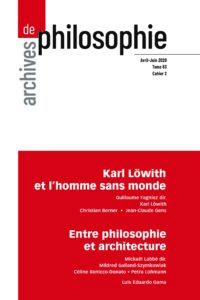 Volume 83, Issue 2, April-June 2020
Volume 83, Issue 2, April-June 2020
Karl Löwith: Anthropology of the wordless man
 Guillaume Fagniez, Karl Löwith: Anthropology of the worldless man. Foreword
Guillaume Fagniez, Karl Löwith: Anthropology of the worldless man. Foreword
Karl Löwith, The world and the human world
In this text from 1960, Karl Löwith explores the origins of “worldlessness,” which he considers to characterize the situation of the modern human. He brings to light the Judeo-Christian sources of the occultation of the natural world by the human-historical world and shows how the subjectivism of modern philosophy has further reinforced this worldlessness. Löwith thus indicates the necessity and possibility of rethinking the natural world as such, in which humans could find their rightful place.
Christian Berner, Karl Löwith and the question of anthropology. A reading based on Das Individuum in der Rolle des Mitmenschen
This contribution studies the philosophical anthropology of Karl Löwith by examining his habilitation thesis, Das Individuum in der Rolle des Mitmenschen (1928). The study of this work, which Löwith tells us is “anthropologically thought out,” will enable us to establish the initial framework of his anthropology, the aim of which we will show to be ethical. It is probably here, as we will demonstrate by looking at Gadamer’s reading of Löwith, that the true distance with Heideggerian ontology takes place, even while Löwith’s thinking seeks to expunge his anthropology from all anthropocentrism.
Guillaume Fagniez, Karl Löwith’s critique of historical existence
This study examines Karl Löwith’s “critique of historical existence,” by shedding light on its emergence, its significance, and its current significance. I distinguish Löwith’s investigation of the “theological background of the philosophy of history” and his radical criticism of the “historical world.” While highlighting the difficulties of transcending the modern paradigm of history, the article considers the place of Löwith’s work within a global reevaluation of the relationships between nature and history.
Jean-Claude Gens, Karl Löwith: The cosmos, the sea, and chaos
Löwith understands the modern philosophies of history as a result of the disintegration of the Greek idea of the world as a unified totality. The historical world became the only possible meaning of the world, a meaning that implies the occultation of the natural dimension of our world. Löwith seeks to rediscover this natural dimension, which can be found in Greek culture or later in Nietzsche’s philosophy, as in Paul Valéry’s works.
Between philosophy and architecture
Mickaël Labbé, Between philosophy and architecture. Foreword
Mildred Galland-Szymkowiak, Schelling and architecture. From absolute identity to biomimicry
This article examines the meaning of architecture in Schelling’s philosophy around 1802–05. It shows how the philosopher undermined the thesis of architecture-art as an imitation of simple construction, and how he eventually defined architectural art by its capacity to convey allegories of the organic in the inorganic. Finally, we illustrate several levels of understanding of this characterization. Examples are taken from both Schelling and from a variety of recent bio-inspired architectural buildings.
Céline Bonicco-Donato, Philosophical deconstruction and architectural deconstructivism
Among the many dialogues established between architectural movements and philosophical theories, the one that combines spatial deconstructivism and Derridean deconstruction is extremely original. Going beyond the stage of simple interpretation in which architects borrow their concepts from philosophers, it has, in fact, taken the form of a true collaboration that has not left Derrida’s thinking unscathed: faced with the Parc de la Villette, the philosopher was led to modify his perspective on deconstruction, both in its content and in its disciplinary boundaries.
Petra Lohmann, The happy life as an architectural task. Fichte and Schinkel
Education for life, in the highest sense of free self-completion, is the fixed and immovable goal of Fichte’s philosophical work. In the speculative sense, Fichte combines the concept of image with the possibility of designing future visions, in which an ideal image does not depict reality, but instead represents the future. The translation of these pictures or ideas into reality can only be achieved through art, which provides a sensual vision of the idea in immediate life. While this fact may be relatively well known in the literature on Fichte, this article seeks to extend it into the realm of architecture, understood as a “symbol of life.”.
Mickaël Labbé, The architecture of Paulo Mendes da Rocha. Opportunity beyond function
Paulo Mendes da Rocha (born in 1928, and winner of the Pritzker Architecture Prize in 2006), one of the greatest architects of our time, is also a highly original theoretician. But his thinking and works are still not well known outside of Brazil. This article aims to summarize his main ideas in architecture, which intimately unite aesthetics and politics under the banner of an opportune architecture.
* * *
Luis Eduardo Gama, Friendship and solidarity. The politics of Hans-Georg Gadamer
Hermeneutic philosophy is generally presented as a phenomenology of understanding and an ontology of human existence and language. Thus, its potential to analyze and critique social and political reality is limited. However, some of Hans-Georg Gadamer’s later texts attempt to translate his ontological approaches into concrete reflections on human praxis in our contemporary societies. Hence, they construct the bases of a true social and political philosophy that has an eminently critical vocation. Through the notions of friendship and solidarity that Gadamer develops in his final years, this article examines this political turn of hermeneutics.
